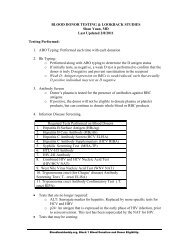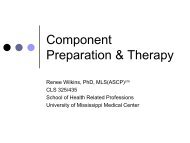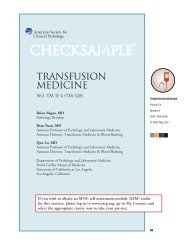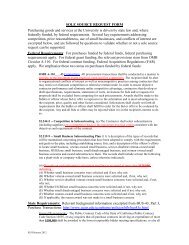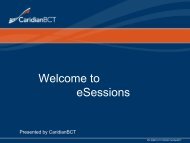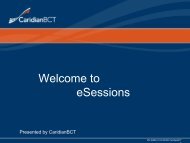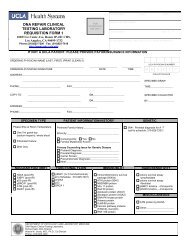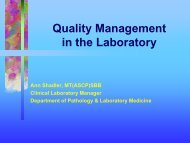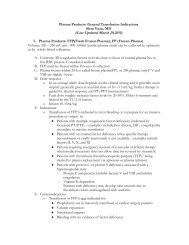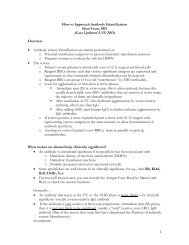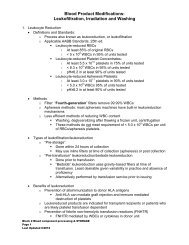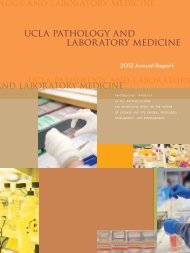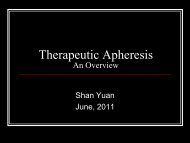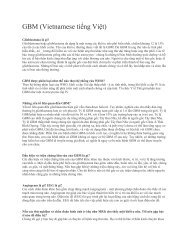CMP Student Manual - the UCLA Department of Pathology ...
CMP Student Manual - the UCLA Department of Pathology ...
CMP Student Manual - the UCLA Department of Pathology ...
- No tags were found...
You also want an ePaper? Increase the reach of your titles
YUMPU automatically turns print PDFs into web optimized ePapers that Google loves.
September 1, 2012<br />
Dear New and Continuing Graduate <strong>Student</strong>s:<br />
On behalf <strong>of</strong> <strong>the</strong> faculty and staff in <strong>the</strong> <strong>Department</strong> <strong>of</strong> <strong>Pathology</strong> and Laboratory Medicine, I<br />
want to welcome you to <strong>the</strong> start <strong>of</strong> <strong>the</strong> 2012-2013 academic year. We are particularly pleased that<br />
you have chosen to initiate your studies in <strong>the</strong> Cellular and Molecular <strong>Pathology</strong> Graduate<br />
Program. We wish all <strong>of</strong> you great success in your research.<br />
This is <strong>the</strong> 13th edition <strong>of</strong> a manual that has been prepared to provide information about <strong>the</strong><br />
department and degree requirements <strong>of</strong> <strong>the</strong> Cellular and Molecular <strong>Pathology</strong> Graduate Program.<br />
We hope that you will find it <strong>of</strong> value and would welcome your suggestions for future editions.<br />
No assembly <strong>of</strong> forms and short descriptions can explain everything or anticipate every situation,<br />
so you should be aware that <strong>the</strong>re are numerous additional sources <strong>of</strong> information. For example,<br />
<strong>the</strong> Graduate Division's informative on-line site (www.gdnet.ucla.edu) has up to date details<br />
regarding degree requirements and campus regulations.<br />
We also want you to feel free to contact members <strong>of</strong> <strong>the</strong> department for assistance. Obviously,<br />
your research mentor will be a key source <strong>of</strong> guidance on most matters that arise. Members <strong>of</strong><br />
your doctoral committee are ano<strong>the</strong>r valuable resource. The department also has a dedicated staff<br />
able to help you with <strong>the</strong> multiple administrative issues that are part <strong>of</strong> any large organization.<br />
Finally, you should convey thoughts about <strong>the</strong> program and ideas for constructive change to your<br />
graduate student representatives.<br />
As Graduate Program Director, I am happy to meet with you personally, and I hope you will feel<br />
free to contact me. I can be reached by phone at 310-206-9535 or by e-mail at<br />
kdorshki@mednet.ucla.edu. My <strong>of</strong>fice is located in 11-232 Factor Building.<br />
Again, welcome to <strong>the</strong> department. We wish you continued success and hope your stay here will<br />
be enjoyable and pr<strong>of</strong>itable from both an educational and a personal perspective.<br />
Sincerely,<br />
Kenneth Dorshkind, Ph.D.<br />
Pr<strong>of</strong>essor and Vice Chair (Research)<br />
Director, Cellular and Molecular <strong>Pathology</strong> Graduate Program<br />
2
I.<br />
OVERVIEW OF THE DEPARTMENT OF<br />
PATHOLOGY AND LABORATORY MEDICINE<br />
The <strong>Department</strong> <strong>of</strong> <strong>Pathology</strong> and Laboratory Medicine<br />
Organization <strong>of</strong> <strong>the</strong> Cellular and Molecular <strong>Pathology</strong> Graduate Program<br />
Faculty Roster<br />
<strong>Student</strong> Roster<br />
Important Phone Numbers<br />
3
THE DEPARTMENT OF PATHOLOGY AND LABORATORY MEDICINE<br />
The Graduate Program in Cellular and Molecular <strong>Pathology</strong> (<strong>CMP</strong>) is an integral part <strong>of</strong> <strong>the</strong><br />
research enterprise <strong>of</strong> <strong>the</strong> <strong>Department</strong> <strong>of</strong> <strong>Pathology</strong> and Laboratory Medicine and <strong>of</strong>fers a<br />
program <strong>of</strong> study leading to <strong>the</strong> Ph.D. in Cellular and Molecular <strong>Pathology</strong>. All participating<br />
graduate program faculty are members <strong>of</strong> <strong>the</strong> <strong>Department</strong> <strong>of</strong> <strong>Pathology</strong> and Laboratory Medicine.<br />
The missions <strong>of</strong> <strong>the</strong> <strong>Department</strong> <strong>of</strong> <strong>Pathology</strong> and Laboratory Medicine are patient care,<br />
residency/fellowship instruction, medical and dental school education, research, and graduate<br />
education.<br />
History<br />
The <strong>Department</strong> <strong>of</strong> <strong>Pathology</strong> and Laboratory Medicine at <strong>UCLA</strong> was formed in <strong>the</strong> summer <strong>of</strong><br />
1951, and Dr. Sydney Madden served as chair for <strong>the</strong> first twenty years. Subsequently, Drs. Julien<br />
Van Lancker and Pasquale Cancilla served as chair for about ten years each. During <strong>the</strong>se periods,<br />
multiple research programs matured and <strong>the</strong> Experimental <strong>Pathology</strong> Ph.D. program was<br />
established. Dr. Jonathan Braun became interim chair in 1994 and permanent chair in 1995. The<br />
graduate program name was changed from “Experimental <strong>Pathology</strong>” to “Cellular and Molecular<br />
<strong>Pathology</strong>” in 2002.<br />
Organization<br />
The <strong>Department</strong> <strong>of</strong> <strong>Pathology</strong> and Laboratory Medicine is organized into several divisions focused<br />
on i) Clinical Services, ii) Research Services, iii) Resident and Fellowship Education, iv) Research,<br />
and v) Integrative Anatomy (Figure 1). The heads <strong>of</strong> each <strong>of</strong> <strong>the</strong>se units are members <strong>of</strong> <strong>the</strong><br />
<strong>Pathology</strong> Executive Committee, chaired by Dr. Braun, which serves as a forum for decision<br />
making and communication to faculty and staff.<br />
Clinical Services: The <strong>Department</strong> <strong>of</strong> <strong>Pathology</strong> and Laboratory Medicine provides morphologic<br />
and analytical diagnostic services through its Anatomic <strong>Pathology</strong> and Clinical <strong>Pathology</strong><br />
laboratories located in Westwood and at additional <strong>UCLA</strong> affiliated hospitals in <strong>the</strong> greater Los<br />
Angeles area.<br />
Research Services: The Immunogenetics laboratory, which provides clinical histocompatibility<br />
testing, is a cornerstone <strong>of</strong> this division. In addition, several key core laboratories support basic<br />
and translational research studies. For example, <strong>the</strong> recently established Clinical Microarray Core<br />
(CMC) is a high-throughput genomic facility with a focus on complex genetic testing for <strong>the</strong><br />
characterization <strong>of</strong> widely prevalent diseases. The CMC <strong>of</strong>fers Affymetrix GeneChip-based<br />
molecular diagnostic, prognostic, and o<strong>the</strong>r personalized testing by gene expression pr<strong>of</strong>iling,<br />
high-throughput genotyping, copy number variation assay, and o<strong>the</strong>r genetic analyses.<br />
4
Resident and Fellowship Education: The <strong>Department</strong> <strong>of</strong>fers an outstanding program <strong>of</strong> clinical<br />
education in Anatomic and Clinical <strong>Pathology</strong>. Residents experience both areas <strong>of</strong> pathology early<br />
in <strong>the</strong>ir training and obtain hands-on experience that is augmented by conferences, problemsolving<br />
sessions, and didactic presentations. The <strong>Department</strong> also <strong>of</strong>fers fellowship training in<br />
Neuropathology, Dermatopathology, GI/Liver <strong>Pathology</strong>, Transfusion Medicine,<br />
Hematopathology, Cytopathology, Molecular <strong>Pathology</strong>, Cardio-Pulmonary <strong>Pathology</strong>,<br />
Women’s Health, Clinical Microbiology, and Surgical <strong>Pathology</strong>.<br />
Training <strong>of</strong> residents and fellows in general does not overlap with <strong>the</strong> graduate program.<br />
However, fellows have <strong>the</strong> opportunity to pursue <strong>the</strong> Ph.D. degree in Cellular and Molecular<br />
<strong>Pathology</strong> through <strong>the</strong> <strong>UCLA</strong> STAR program, described in Section III.<br />
Research: The responsibilities <strong>of</strong> <strong>the</strong> research division include administration <strong>of</strong> space,<br />
disbursement <strong>of</strong> equipment funds, and review <strong>of</strong> requests for bridge funding. The <strong>CMP</strong> Graduate<br />
Program is a component within <strong>the</strong> research division.<br />
The Vice-Chair for Research heads a Research Committee that makes decisions regarding major<br />
equipment purchases and reviews requests for space and bridge funding. The <strong>CMP</strong> Graduate<br />
Program Director is a member <strong>of</strong> <strong>the</strong> Research Committee, thus ensuring that <strong>the</strong> interests <strong>of</strong> <strong>the</strong><br />
<strong>CMP</strong> Graduate Program are integrated into <strong>the</strong> division’s decision making process. Also, as noted<br />
above, <strong>the</strong> Vice-Chair for Research is a member <strong>of</strong> <strong>the</strong> <strong>Department</strong> Executive Committee and<br />
represents graduate program issues at that level.<br />
Integrative Anatomy: This division focuses on curriculum development and instruction in <strong>the</strong><br />
schools <strong>of</strong> medicine and dentistry and operates independent <strong>of</strong> <strong>the</strong> <strong>CMP</strong> Graduate Program.<br />
Administrative Services<br />
The <strong>Department</strong> <strong>of</strong> <strong>Pathology</strong> and Laboratory Medicine has a large administrative structure to<br />
support its clinical and academic missions. The following units are <strong>of</strong> direct relevance to <strong>the</strong> <strong>CMP</strong><br />
Graduate Program:<br />
Contracts and Grants Administration: This unit includes several fund managers, each <strong>of</strong> whom<br />
manages <strong>the</strong> grants and contracts portfolios <strong>of</strong> individual research faculty members. The fund<br />
managers in this <strong>of</strong>fice interact with departmental personnel <strong>of</strong>ficers and <strong>the</strong> <strong>CMP</strong> student affairs<br />
<strong>of</strong>ficers to facilitate <strong>the</strong> appointment <strong>of</strong> <strong>CMP</strong> graduate students to research and training grants and<br />
to deal with any financial issues that arise.<br />
Information Services: This unit is responsible for supporting <strong>the</strong> <strong>Department</strong>al network<br />
infrastructure, <strong>the</strong> <strong>Department</strong>al WEB site, and <strong>the</strong> clinical laboratory computer system.<br />
6
Facilities Management: This unit is responsible for coordinating space planning, laboratory moves,<br />
construction, renovation, and equipment maintenance. The value <strong>of</strong> this <strong>Department</strong>-based unit<br />
can not be overemphasized, because research investigators no longer have to take valuable time to<br />
find out who to call to solve a physical plant or equipment maintenance problem.<br />
Location <strong>of</strong> Research Laboratories<br />
Faculty research laboratories are located in <strong>the</strong> main CHS complex (<strong>the</strong> 1P and 1-3 areas), <strong>the</strong><br />
Brain Research Institute/Neuropsychiatric Institute, <strong>the</strong> Rehabilitation Center, <strong>the</strong> Factor<br />
Building, <strong>the</strong> Macdonald Medical Research Lab, and <strong>the</strong> Terasaki Life Sciences Building. In<br />
addition, <strong>the</strong> financial management group and personnel operations are located in <strong>the</strong> Bank <strong>of</strong><br />
America building in Westwood Village.<br />
7
ORGANIZATION OF THE CELLULAR AND MOLECULAR PATHOLOGY<br />
GRADUATE PROGRAM<br />
As described above, <strong>the</strong> head <strong>of</strong> <strong>the</strong> <strong>CMP</strong> Graduate Program is <strong>the</strong> Graduate Advisor, who reports<br />
to <strong>the</strong> Vice-Chair for Research. For <strong>the</strong> 2012-2013 academic year, Dr. Kenneth Dorshkind serves<br />
as both. The <strong>CMP</strong> <strong>Student</strong> Affairs Officer (SAO) provides administrative support to <strong>the</strong> Graduate<br />
Advisor and graduate students. The Graduate Advisor and <strong>the</strong> SAO are <strong>the</strong> primary contacts for<br />
students enrolled in <strong>the</strong> program, and both are available to provide advice and assistance.<br />
The majority <strong>of</strong> student issues involve routine clarification or interpretation <strong>of</strong> graduate division<br />
or <strong>CMP</strong> Graduate Program requirements. However, policy issues <strong>of</strong>ten arise that do not fall<br />
within <strong>the</strong>se confines. In this case, <strong>the</strong> Graduate Advisor first consults with members <strong>of</strong> <strong>the</strong><br />
Graduate Program Executive Committee, formed by <strong>the</strong> Graduate Advisor, <strong>the</strong> Vice-Chair for<br />
Research, and one to two additional <strong>CMP</strong> faculty members. The 2012-2013 members <strong>of</strong> <strong>the</strong> <strong>CMP</strong><br />
Graduate Executive Committee, chaired by Dr. Dorshkind, are Drs. Steven Bensinger, Gay<br />
Crooks, Samuel French, and Tomas Ganz.<br />
Figure 2. Organization <strong>of</strong> <strong>the</strong><br />
<strong>CMP</strong> Graduate Program.<br />
However, for matters that involve reformulation <strong>of</strong> program policy or course requirements, <strong>the</strong><br />
entire <strong>CMP</strong> program faculty meets to discuss <strong>the</strong> matter. It is also important to emphasize that<br />
student input is solicited whenever changes are made to <strong>the</strong> program. In this regard, <strong>the</strong> <strong>CMP</strong><br />
graduate students elect two representatives each year, and <strong>the</strong>se individuals routinely meet with<br />
<strong>the</strong> Graduate Advisor and attend <strong>CMP</strong> graduate faculty meetings.<br />
Graduate <strong>Student</strong> Representatives<br />
Two graduate student representatives are selected by <strong>the</strong> graduate students each year. These<br />
individuals meet with <strong>the</strong> graduate students on a regular basis and convey general student concerns<br />
and issues to <strong>the</strong> Graduate Advisor.<br />
8
<strong>CMP</strong> FACULTY ROSTER<br />
Linda Baum, M.D., Ph.D. -- Glycans in cell-cell interactions and immune<br />
function<br />
Email: lbaum@mednet.ucla.edu<br />
Steven Bensinger, V.M.D., Ph.D. -- Metabolic regulation <strong>of</strong> immune<br />
function<br />
Email: sbensinger@mednet.ucla.edu<br />
Judith Berliner, Ph.D. -- Lipid regulation <strong>of</strong> monocyte endo<strong>the</strong>lial<br />
interactions - implications for a<strong>the</strong>rosclerosis<br />
Email: jberliner@mednet.ucla.edu<br />
Jonathan Braun, M.D., Ph.D. -- Mucosal immunology, immunologic<br />
imaging, and inflammatory bowel disease<br />
Email: jbraun@mednet.ucla.edu<br />
Alistair Cochran, M.D. -- Melanocytic tumors and <strong>the</strong> interactions <strong>of</strong><br />
immunological, molecular and genetic factors that determine whe<strong>the</strong>r<br />
metastatic spread occurs and favorable or unfavorable outcome for<br />
individual patients<br />
Email: acochran@mednet.ucla.edu<br />
Gay Crooks, M.D. -- Human hematopoiesis and thymus development<br />
Email: gcrooks@mednet.ucla.edu<br />
David Dawson, M.D., Ph.D. -- Epigenetics and growth signaling in<br />
pancreatic carcinogenesis<br />
Email: ddawson@mednet.ucla.edu<br />
Kenneth Dorshkind, Ph.D. -- Lymphocyte development<br />
from embryogenesis through senescence<br />
Email: kdorshki@mednet.ucla.edu<br />
Thomas Drake, M.D. -- Integrating genetics and gene expression to study<br />
complex disease pathogenesis<br />
Email: tdrake@mednet.ucla.edu<br />
Steven Dubinett, M.D. -- Inflammation in lung cancer progression and<br />
response to <strong>the</strong>rapy<br />
Email: sdubinett@mednet.ucla.edu<br />
Office: 4-730 MRL<br />
Phone: 6-5985<br />
Office: 36-120 CHS<br />
Phone: 5-9885<br />
Office: 4-760 MRL<br />
Phone: 5-2436<br />
Office: 13-222 CHS<br />
Phone: 4-7953<br />
Office: 13-145C CHS<br />
Phone: 5-2743<br />
Office: 3014 TLSB<br />
Phone: 6-0205<br />
Office: 14-118 CHS<br />
Phone: 7-2799<br />
Office: 11-232 Factor<br />
Phone: 6-9535<br />
Office: AL-124 CHS<br />
Phone: 5-6975<br />
Office: 37-131 CHS<br />
Phone: 7-2725<br />
9
Rita Effros, Ph.D. -- Immunodeficiency <strong>of</strong> HIV & aging;<br />
Osteoimmunology: <strong>the</strong> link between T cells and bone<br />
Email: reffros@mednet.ucla.edu<br />
Michael Fishbein, M.D. -- Formation and progression <strong>of</strong> lung cancer<br />
Email: mfishbein@mednet.ucla.edu<br />
Samuel French, M.D., Ph.D. -- Hepatitis C Viral Mediated<br />
Hepatocarcinogenesis<br />
Email: sfrench@mednet.ucla.edu<br />
Tomas Ganz, M.D., Ph.D. -- Innate immunity in host defense and iron<br />
metabolism<br />
Email: tganz@mednet.ucla.edu<br />
Ben Glasgow, M.D. -- Pathogenesis <strong>of</strong> ocular disease<br />
Email: bglasgow@mednet.ucla.edu<br />
Wayne Grody, M.D., Ph.D. -- Molecular Genetics <strong>of</strong> Metabolic and<br />
Heritable Neoplastic Diseases<br />
Email: wgrody@mednet.ucla.edu<br />
Oliver Hankinson, Ph.D. -- Chemical carcinogenesis, role <strong>of</strong> hypoxia in<br />
tumor growth<br />
Email: ohank@mednet.ucla.edu<br />
Jiaoti Huang, M.D., Ph.D. -- Molecular mechanisms <strong>of</strong> prostate cancer<br />
Email: jiaotihuang@mednet.ucla.edu<br />
Kathleen Kelly, Ph.D. -- Reproductive mucosal immune trafficking,<br />
inflammation and pathogenesis <strong>of</strong> STDs<br />
Email: kkelly@mednet.ucla.edu<br />
Jerzy Kupiec-Weglinski, M.D. -- Liver and pancreas transplantation<br />
Email: jkupiec@mednet.ucla.edu<br />
Siavash Kurdistani, M.D., Ph.D. -- Cancer Epigenetics<br />
Email: skurdistani@mednet.ucla.edu<br />
Benhur Lee, M.D. -- Viral Attachment and Entry, HIV and Emerging<br />
Viruses, Glycobiology<br />
Email: bleebhl@ucla.edu<br />
Office: 13-344 CHS<br />
Phone: 5-0748<br />
Office: 13-145H CHS<br />
Phone: 5-9731<br />
Office: 14-118 CHS<br />
Phone: 7-2795<br />
Office: 37-055 CHS<br />
Phone: 5-6112<br />
Office: B-279 JSEI<br />
Phone: 5-6998<br />
Office: 1P-249 CHS<br />
Phone: 5-5648<br />
Office: 13-244 Factor<br />
Phone: 5-2936<br />
Office: 13-229 CHS<br />
Phone: 7-2264<br />
Office: 1P-245 CHS<br />
Phone: 6-5562<br />
Office: 77-120 CHS<br />
Phone: 5-4196<br />
Office: 377B BSRB<br />
Phone: 4-5194<br />
Office: 251A BSRB<br />
Phone: 4-2132<br />
10
Xin Liu, M.D., Ph.D. -- Molecular biology <strong>of</strong> cognition<br />
Email: xliu@mednet.ucla.edu<br />
Michael Phelps, Ph.D. -- Molecular Imaging with PET and <strong>the</strong> biology <strong>of</strong><br />
disease<br />
Email: mphelps@mednet.ucla.edu<br />
Dinesh Rao, M.D., Ph.D. -- Understanding <strong>the</strong> role <strong>of</strong> microRNAs in<br />
hematopoietic development and cancer<br />
Email: drao@mednet.ucla.edu<br />
Jianyu Rao, M.D. -- Cancer molecular signatures, biomarker and<br />
prevention<br />
Email: jrao@mednet.ucla.edu<br />
Elaine Reed, Ph.D. -- Immunogenetics and transplant immunology<br />
Email: ereed@mednet.ucla.edu<br />
Jonathan Said, M.D. -- Lymphoma and urologic cancer biology and<br />
<strong>the</strong>rapy<br />
Email: jsaid@mednet.ucla.edu<br />
Robert Schiestl, Ph.D. -- Gene-Environment-Nutrition interactions in<br />
predisposition to cancer<br />
Email: rschiestl@mednet.ucla.edu<br />
Ram Raj Singh, M.D. -- Autoimmune diseases: T, NKT and dendritic cells;<br />
Immune tolerance; Biomarkers<br />
Email: rrsingh@mednet.ucla.edu<br />
Michael Teitell, M.D., Ph.D. -- Cancer mechanisms and nanosystems<br />
Email: mteitell@mednet.ucla.edu<br />
James Tidball, Ph.D. -- Pathophysiological mechanisms in muscular<br />
dystrophy<br />
Email: jtidball@physci.ucla.edu<br />
Peter Tontonoz, M.D., Ph.D. -- Nuclear hormone receptor family in<br />
metabolism and inflammation<br />
Email: ptontonoz@mednet.ucla.edu<br />
Harry Vinters, M.D., Ph.D. -- Pathogenesis <strong>of</strong> degenerative, vascular and<br />
malformative diseases <strong>of</strong> <strong>the</strong> nervous system<br />
Email: hvinters@mednet.ucla.edu<br />
Office: 23-263 CHS<br />
Phone: 4-5880<br />
Office: 23-138 CHS<br />
Phone: 5-6539<br />
Office: 12-272 Factor<br />
Phone: 5-1675<br />
Office: 10-952 Factor<br />
Phone: 4-1567<br />
Office: 15-20 Rehab<br />
Phone: 4-4943<br />
Office: 13-226 CHS<br />
Phone: 5-1149<br />
Office: 71-295 CHS<br />
Phone: 7-2087<br />
Office: 32-59 Rehab<br />
Phone: 5-5410<br />
Office: 4-762 MRL<br />
Phone: 6-6754<br />
Office: 5833 LSB<br />
Phone: 6-3395<br />
Office: 4-726 MRL<br />
Phone: 6-4546<br />
Office: 18-170B NPI<br />
Phone: 5-6191<br />
11
Anna Wu, Ph.D. -- Engineered antibodies for cancer targeting and<br />
imaging<br />
Email: awu@mednet.ucla.edu<br />
Office: 4335 CNSI<br />
Phone: 4-5088<br />
12
<strong>CMP</strong> STUDENT ROSTER 2012-2013<br />
STUDENT MENTOR CONTACT<br />
ARENSMAN, Michael<br />
2011 (ACCESS)<br />
CHIN, Julia<br />
2012 (ACCESS)<br />
CHOU, Jennifer<br />
2009 (ACCESS)<br />
CONTRERAS, Jorge<br />
2011 (ACCESS)<br />
DOCK, Jeffrey<br />
2008 (ACCESS)<br />
GRANT, Jeanette<br />
2009 (ACCESS)<br />
HONG, Jason<br />
2012 (ACCESS)<br />
JACOBS, Jonathan<br />
2001 (STAR)<br />
KIM, Airie<br />
2009 (STAR)<br />
KIM, William<br />
2009 (ACCESS)<br />
KOHN, Lisa<br />
2009 (MSTP)<br />
RODRIGUEZ, Nicole<br />
2006 (ACCESS)<br />
RODRIGUEZ –<br />
MALAVE, Norma<br />
2011 (ACCESS)<br />
RONG, Xin<br />
2010 (ACCESS)<br />
SALEHI, Sahar<br />
2012 (ACCESS)<br />
SEET, Christopher<br />
2012 (STAR)<br />
TRAN, Cynthia<br />
2011 (ACCESS)<br />
DAWSON, David<br />
CROOKS, Gay<br />
EFFROS, Rita<br />
RAO, Dinesh<br />
EFFROS, Rita<br />
DUBINETT, Steven<br />
TEITELL, Michael<br />
BRAUN, Jonathan<br />
GANZ, Tomas<br />
CROOKS, Gay<br />
CROOKS, Gay<br />
DUBINETT, Steven<br />
RAO, Dinesh<br />
TONTONOZ, Peter<br />
REED, Elaine<br />
CROOKS, Gay<br />
SINGH, Ram Raj<br />
marensman@ucla.edu<br />
Lab: 8-240 Factor, x50618<br />
ccjmy@ucla.edu<br />
Lab: 3009A TLSB, x53535<br />
jenpchou@ucla.edu<br />
Lab : 18-111 CHS, x58786<br />
jcontreras06@gmail.com<br />
Lab: 11-544 Factor, x52548<br />
jdock@ucla.edu<br />
Lab: 18-111 CHS, x58786<br />
jlgrant@mednet.ucla.edu<br />
Lab: 10-240 Factor, x69596<br />
j.s.hong@ucla.edu<br />
Lab: 4-567 MRL, x66821<br />
jjacobs@mednet.ucla.edu<br />
Lab: 4-525 MRL, x51469<br />
airiekim@mednet.ucla.edu<br />
Lab: 52-164 CHS, x57499<br />
tbsound@ucla.edu<br />
Lab: 3009A TLSB, x53535<br />
lakohn@ucla.edu<br />
Lab: 3009A TLSB, x53535<br />
nlrodriguez@mednet.ucla.edu<br />
Lab: 10-240 Factor, x69596<br />
normairodriguez@gmail.com<br />
Lab: 11-544 Factor, x52548<br />
rongxin1215@gmail.com<br />
Lab: 6-629 MRL, x54622<br />
saharsalehi@ucla.edu<br />
Lab: A5-38 Rehab, x44945<br />
cseet@mednet.ucla.edu<br />
Lab: 3009A TLSB, x53535<br />
cindy.t.tran@ucla.edu<br />
Lab: 35-40 Rehab, x63608<br />
13
WALSH, Nicole<br />
2008 (ACCESS)<br />
WANG, Jiexin<br />
2011 (ACCESS)<br />
TEITELL, Michael<br />
TONTONOZ, Peter<br />
nwalsh@mednet.ucla.edu<br />
Lab: 4-567 MRL, x66821<br />
jiexinwang@mednet.ucla.edu<br />
Lab: 6-629 MRL, x54622<br />
14
IMPORTANT PHONE NUMBERS<br />
CONTACT POSITION PHONE OFFICE<br />
Dr. Kenneth<br />
Dorshkind<br />
Graduate Program<br />
Director<br />
6-9535 11-232 Factor<br />
Christina Kim<br />
Graduate Program<br />
<strong>Student</strong> Affairs<br />
Manager<br />
5-8119 1P-166 CHS<br />
Doug Smoot<br />
Graduate Program<br />
<strong>Student</strong> Affairs<br />
Officer<br />
6-1770 1P-171 CHS<br />
Judy Mossman<br />
Personnel and<br />
Payroll<br />
4-1355 Suite 730, B<strong>of</strong>A Bldg.<br />
Adel Nepomuceno<br />
Personnel, Payroll<br />
and Parking<br />
6-5008 Suite 730, B<strong>of</strong>A Bldg.<br />
David Islas<br />
Research<br />
Administration<br />
6-9897 Suite 400A, B<strong>of</strong>A Bldg.<br />
Elisabeth Siauw Purchasing 5-9162 Suite 400A, B<strong>of</strong>A Bldg.<br />
Noel Lau<br />
Computer<br />
Helpdesk<br />
5-6270<br />
A2-260 CHS<br />
PathHelpDesk@mednet.ucla.edu<br />
15
II.<br />
THE CELLULAR AND MOLECULAR PATHOLOGY GRADUATE PROGRAM<br />
Outline <strong>of</strong> <strong>the</strong> Cellular and Molecular <strong>Pathology</strong> Graduate Program<br />
Cellular and Molecular <strong>Pathology</strong> Graduate Program Requirements<br />
Time to Degree Policy<br />
16
OUTLINE OF THE CELLULAR AND MOLECULAR<br />
PATHOLOGY GRADUATE PROGRAM<br />
YEAR 1 (ACCESS)<br />
Complete All ACCESS Requirements<br />
Complete First TA Requirement<br />
YEAR 2<br />
(ENTRY INTO THE <strong>CMP</strong><br />
GRADUATE PROGRAM)<br />
Complete <strong>Pathology</strong> M237 (or APPROVED<br />
equivalent course if M237 taken during<br />
ACCESS year)<br />
Nominate Doctoral Committee (by 12/1)<br />
Convene First Committee Meeting - present<br />
initial research objectives and set timeline for<br />
Oral Qualifying Exam (by 6/1)<br />
Complete Course Requirements<br />
Complete Second TA Requirement<br />
YEAR 3<br />
Complete Written and Oral Qualifying Exam<br />
(a.k.a. Second Committee Meeting by 6/1)<br />
Advance to Candidacy<br />
YEAR 4<br />
Convene Third Committee Meeting - present<br />
research update/progress (by 6/1)<br />
Convene Fourth Committee Meeting - discuss<br />
dissertation goals and set timeline for Final<br />
Oral Exam<br />
YEAR 5<br />
Complete Final Oral Exam (by mid-Spring<br />
Quarter; see Graduate Division deadline)<br />
File Dissertation<br />
17
CELLULAR AND MOLECULAR PATHOLOGY<br />
GRADUATE PROGRAM REQUIRMENTS<br />
Only students who have been admitted to <strong>UCLA</strong> through <strong>UCLA</strong> ACCESS may enter <strong>the</strong> <strong>CMP</strong><br />
Graduate Program. <strong>Student</strong>s are not admitted directly. Following completion <strong>of</strong> <strong>the</strong> year 1<br />
ACCESS core curriculum, students in good standing may enter <strong>the</strong> <strong>CMP</strong> Graduate Program<br />
following acceptance into <strong>the</strong> laboratory <strong>of</strong> a <strong>CMP</strong> Graduate Program faculty member. They <strong>the</strong>n<br />
undertake a program <strong>of</strong> coursework and research that leads to <strong>the</strong> Ph.D. degree in Cellular and<br />
Molecular <strong>Pathology</strong>.<br />
A. Coursework and Teaching Requirements:<br />
i. Coursework:<br />
All students are required to complete <strong>Pathology</strong> M237 “Cellular and Molecular Basis <strong>of</strong> Disease”<br />
(or an approved equivalent course if M237 was taken during year 1 in ACCESS), and one <strong>of</strong> <strong>the</strong><br />
following options:<br />
a. Three 298 seminar courses; at least one must focus on mechanism(s) <strong>of</strong> disease. The seminar<br />
must be a separate and distinct 2 unit seminar course, not associated with ano<strong>the</strong>r course.<br />
Additionally, <strong>the</strong> seminar must require that each student make at least one formal<br />
presentation.<br />
b. <strong>Pathology</strong> 294 “Basic Concepts in Oncology” and one 298 seminar course. (Note: If<br />
<strong>Pathology</strong> 294 was taken during year 1 to satisfy an ACCESS course requirement, it cannot<br />
be used to meet this option in <strong>the</strong> <strong>CMP</strong> program)<br />
c. <strong>Pathology</strong> 240 “Transplantation Immunobiology” and one 298 seminar course.<br />
<strong>Student</strong>s are required to be enrolled in at least 12 units each quarter. In addition to formal courses<br />
and seminars, <strong>the</strong> 12 unit requirement may be met by enrollment in <strong>Pathology</strong> 596 (Directed<br />
Individual Study or Research) or <strong>Pathology</strong> 599 (Preparation <strong>of</strong> Ph.D. Dissertation). Enrollment in<br />
<strong>Pathology</strong> 599 occurs only after advancement to candidacy.<br />
Additional advanced didactic courses may be substituted for up to two <strong>of</strong> <strong>the</strong> 298 seminar courses<br />
if approved by <strong>the</strong> Cellular and Molecular <strong>Pathology</strong> Graduate Program Director. <strong>Student</strong>s<br />
considering this option should seek approval BEFORE enrolling in such courses, as curriculum<br />
substitutions may not be retroactively approved.<br />
The Academic Calendar and Schedule <strong>of</strong> Classes may be obtained online at<br />
http://www.registrar.ucla.edu/schedule/schedulehome.aspx.<br />
18
ii. Teaching Requirement:<br />
<strong>Student</strong>s are required to serve as teaching assistants for two (2) quarters and complete a course in<br />
teaching principles and methods. One quarter <strong>of</strong> teaching and <strong>the</strong> methods course are usually<br />
completed during year 2 <strong>of</strong> study. The ACCESS program <strong>of</strong>fice maintains a Teaching Assistant<br />
course list and a sign-up list for teaching preferences. Note that students for whom English is not<br />
<strong>the</strong> native language must pass <strong>the</strong> TOP (Test <strong>of</strong> Oral Pr<strong>of</strong>iciency) Exam with a minimum score <strong>of</strong><br />
50 before <strong>the</strong>y can be hired as a teaching assistant. A student scoring 45 may serve as a teaching<br />
assistant if concurrently enrolled in an English as a Second Language course specifically aimed at<br />
improving spoken communication (ESL 39A, 39B, 39C, 38 and 108). Additional information<br />
regarding teaching assignments is available from <strong>the</strong> ACCESS <strong>of</strong>fice in 172 Boyer Hall.<br />
The <strong>CMP</strong> Graduate Program does not encourage teaching beyond 2 quarters, as this can<br />
significantly impede research progress and timely graduation.<br />
B. Nomination <strong>of</strong> Doctoral Committee<br />
The Doctoral Committee, which conducts <strong>the</strong> Oral Qualifying Examination and guides <strong>the</strong><br />
student in <strong>the</strong> preparation and defense <strong>of</strong> <strong>the</strong> dissertation, should be selected by December 1<br />
following entry into <strong>the</strong> <strong>CMP</strong> Graduate Program.<br />
The committee is made up <strong>of</strong> at least four graduate program faculty. This number includes <strong>the</strong><br />
research mentor, who serves as Chair <strong>of</strong> <strong>the</strong> Committee, two additional <strong>CMP</strong> faculty members,<br />
and one eligible faculty member from outside <strong>the</strong> <strong>Department</strong>. The Nomination <strong>of</strong> Doctoral<br />
Committee form may be obtained online at www.gdnet.ucla.edu/forms.asp. The form is<br />
submitted to <strong>the</strong> Graduate Division for final review and approval.<br />
The Doctoral Committee may be reconstituted if <strong>the</strong> student wishes to make any changes to <strong>the</strong><br />
membership after <strong>the</strong> initial nomination has been approved by <strong>the</strong> Graduate Division. A<br />
Reconstitution <strong>of</strong> Doctoral Committee form may be obtained online at<br />
www.gdnet.ucla.edu/forms.asp. A committee may be reconstituted for a variety <strong>of</strong> reasons,<br />
including if <strong>the</strong> student wishes to add additional members or if a member cannot fulfill his/her<br />
responsibilities (sabbatical, transfer, etc.) and must be replaced.<br />
The duties <strong>of</strong> <strong>the</strong> doctoral committee extend beyond simply administering <strong>the</strong> oral examination.<br />
Most importantly, committee members can provide valuable feedback and suggestions regarding<br />
<strong>the</strong>sis research. Consequently, it is important to choose committee members based on <strong>the</strong>ir<br />
familiarity with <strong>the</strong> research to be conducted.<br />
C. Annual Committee Meetings<br />
<strong>Student</strong>s are required to meet with <strong>the</strong>ir doctoral committee at least once a year. During <strong>the</strong> first<br />
meeting, which is held within 6 months after appointing <strong>the</strong> committee, students discuss <strong>the</strong>ir<br />
interests, outline a possible research project, and set a time for <strong>the</strong>ir Oral Qualifying Examination.<br />
19
It is recommended that a 1-2 page outline <strong>of</strong> potential goals for <strong>the</strong> project be submitted to <strong>the</strong><br />
committee at least one week prior to <strong>the</strong> meeting.<br />
<strong>Student</strong>s are expected to present research updates during subsequent meetings. The aim <strong>of</strong> <strong>the</strong>se<br />
meetings is to provide <strong>the</strong> student with constructive comments that will facilitate <strong>the</strong>ir work and<br />
avoid subsequent time-consuming problems. A 1-2 page written summary <strong>of</strong> research results must<br />
be provided to members one week prior to each committee meeting. These meetings should not<br />
extend beyond 90 minutes. Thus, it is important that <strong>the</strong> presentation succinctly summarize past<br />
progress and future goals.<br />
At <strong>the</strong> conclusion <strong>of</strong> every meeting, each committee member must fill out a Report <strong>of</strong> Annual<br />
Committee Meeting, which will be turned in to <strong>the</strong> Graduate Program <strong>Student</strong> Affairs Office and<br />
included in <strong>the</strong> student's file.<br />
D. Written and Oral Qualifying Examination<br />
In order to advance to candidacy, students must prepare a written proposal that is orally presented<br />
to <strong>the</strong> doctoral committee. The Oral Qualifying Examination should be scheduled and completed<br />
by June 1 <strong>of</strong> year 3.<br />
i. The Written Proposal<br />
Approximately two months prior to <strong>the</strong> prospective oral exam date, <strong>the</strong> student should choose <strong>the</strong><br />
oral examination topic. It is recommended that a one page proposal that lists <strong>the</strong> topic and key<br />
aims be submitted to <strong>the</strong> doctoral committee for approval one month prior to <strong>the</strong> exam date.<br />
Once <strong>the</strong> oral exam topic is chosen, <strong>the</strong> student <strong>the</strong>n prepares <strong>the</strong> written proposal to be presented<br />
to <strong>the</strong> doctoral committee.<br />
The written proposal, in <strong>the</strong> form <strong>of</strong> an NIH grant application, must be submitted to <strong>the</strong><br />
committee one week in advance <strong>of</strong> <strong>the</strong> scheduled examination. The student and <strong>the</strong>sis advisor<br />
should plan for 4-6 weeks for completion <strong>of</strong> <strong>the</strong> written proposal and study for <strong>the</strong> oral<br />
examination. The proposal must include <strong>the</strong> following sections:<br />
1. Abstract<br />
The question to be addressed and <strong>the</strong> approaches to be taken should be succinctly described. The<br />
abstract should be ½ page or less.<br />
2. Specific Aims<br />
Provide a short introductory paragraph that delineates <strong>the</strong> broad, long-term objectives and what<br />
<strong>the</strong> specific research is intended to accomplish. State <strong>the</strong> hypo<strong>the</strong>ses to be defended. One page or<br />
less is recommended.<br />
20
3. Background and Significance<br />
Briefly sketch <strong>the</strong> background leading to <strong>the</strong> present proposal, critically evaluate existing<br />
knowledge in <strong>the</strong> field, and identify gaps that <strong>the</strong> project is intended to fill. State concisely <strong>the</strong><br />
importance <strong>of</strong> <strong>the</strong> work to a basic biological or clinical issue. Remember that this section must<br />
provide a rationale for <strong>the</strong> specific aims that have been formulated. Up to three pages is<br />
recommended.<br />
4. Research Design<br />
Describe <strong>the</strong> research design and <strong>the</strong> procedures that will be used to address <strong>the</strong> specific aims.<br />
Include how <strong>the</strong> data will be collected, analyzed, and interpreted. Indicate possible outcomes <strong>of</strong><br />
experiments and how <strong>the</strong>se will influence <strong>the</strong> direction <strong>of</strong> <strong>the</strong> studies. Discuss potential difficulties<br />
and limitations. The experimental methods should not include too many details regarding buffers,<br />
concentrations <strong>of</strong> antibodies, etc., although <strong>the</strong> committee may ask <strong>the</strong> student about such details<br />
during <strong>the</strong> oral presentation. This section should form <strong>the</strong> major portion <strong>of</strong> <strong>the</strong> application and<br />
should be at least four pages in length.<br />
Sections 1-4 should be no more than 10 single-spaced pages in length. Font size should be at least<br />
11 or 12 point with ½ inch margins on all sides. Adherence to <strong>the</strong>se formatting instructions is<br />
mandatory for <strong>the</strong> submission <strong>of</strong> <strong>the</strong> proposal.<br />
5. References<br />
The proposal should be a scholarly document and appropriate references should be cited to<br />
indicate knowledge <strong>of</strong> key papers in <strong>the</strong> field and to support statements that have been made. Each<br />
reference must include <strong>the</strong> title, names <strong>of</strong> all authors, book or journal, volume number, page<br />
numbers, and year <strong>of</strong> publication. Select only those references pertinent to <strong>the</strong> proposal.<br />
References are not included in <strong>the</strong> page count.<br />
ii. Written Proposal Guidelines<br />
1. The written proposal may be related or unrelated to <strong>the</strong> general interest <strong>of</strong> <strong>the</strong> laboratory.<br />
However, <strong>the</strong> proposal cannot focus on <strong>the</strong> student’s proposed dissertation research or a<br />
reformulation <strong>of</strong> any proposal written by any member <strong>of</strong> <strong>the</strong> laboratory.<br />
2. The student may discuss <strong>the</strong> general choice <strong>of</strong> topic with <strong>the</strong> research mentor. However,<br />
once <strong>the</strong> topic is approved, <strong>the</strong> student may no longer discuss any aspect <strong>of</strong> <strong>the</strong> proposal<br />
with <strong>the</strong> mentor or any o<strong>the</strong>r committee member.<br />
iii. Oral Examination Guidelines<br />
1. The student must be registered during <strong>the</strong> terms in which <strong>the</strong> oral examination is taken.<br />
2. The Oral Qualifying Examination may not be held unless a doctoral committee has been<br />
appointed by <strong>the</strong> Graduate Division.<br />
21
3. The examination is open only to <strong>the</strong> committee members and <strong>the</strong> student.<br />
4. All members <strong>of</strong> <strong>the</strong> committee must be present during <strong>the</strong> entire examination.<br />
5. Each member <strong>of</strong> <strong>the</strong> committee must sign <strong>the</strong> Report on <strong>the</strong> Oral Qualifying Examination<br />
form, indicating his/her presence during <strong>the</strong> examination, and record a decision <strong>of</strong> “pass”<br />
or “not pass”. You may obtain this form from <strong>the</strong> SAO.<br />
6. The student will not be advanced to candidacy if more than one member votes “not<br />
passed”.<br />
7. If a majority <strong>of</strong> <strong>the</strong> committee so recommends, <strong>the</strong> Oral Qualifying Examination may be<br />
repeated once within 6 months.<br />
E. Advancement to Candidacy<br />
Upon successful completion <strong>of</strong> <strong>the</strong> written and oral qualifying examination, students will be<br />
advanced to candidacy. <strong>Student</strong>s who fail ei<strong>the</strong>r <strong>the</strong> written or oral aspect <strong>of</strong> this Qualifying Exam<br />
must retake <strong>the</strong> examination within six months. The student is automatically billed for <strong>the</strong><br />
doctoral advancement to candidacy fee ($90.00) at <strong>the</strong> time advancement occurs.<br />
F. FINAL ORAL EXAMINATION (DEFENSE OF THE DISSERTATION)<br />
A final oral presentation and defense <strong>of</strong> <strong>the</strong> student’s Ph.D. dissertation to members <strong>of</strong> <strong>the</strong><br />
doctoral committee is required for completion <strong>of</strong> <strong>the</strong> degree. The Ph.D. dissertation should be an<br />
original body <strong>of</strong> work performed by <strong>the</strong> Candidate. The purpose <strong>of</strong> <strong>the</strong> dissertation is to<br />
demonstrate ability for independent investigation and pr<strong>of</strong>iciency in <strong>the</strong> field. As a general<br />
guideline, it is expected that by <strong>the</strong> time <strong>of</strong> graduation, <strong>CMP</strong> students will have completed significant<br />
work, suitable for <strong>the</strong> publication <strong>of</strong> at least one first author paper in a high quality, peer-reviewed<br />
journal. Ultimately, however, it is up to <strong>the</strong> Doctoral Committee to determine whe<strong>the</strong>r <strong>the</strong> student’s<br />
progress merits award <strong>of</strong> <strong>the</strong> Ph.D.<br />
The <strong>of</strong>ficial <strong>UCLA</strong> Thesis and Dissertation Formatting and Filing Guide contains established<br />
criteria for uniformity in <strong>the</strong> format <strong>of</strong> <strong>the</strong>ses and dissertations. The regulations included in it<br />
supersede any style manual instructions regarding format. It also includes information on filing<br />
dates and procedures, registration <strong>of</strong> copyright, and guidelines for submission. The guide can be<br />
found at http://www.gdnet.ucla.edu/gasaa/library/degreeinfo.htm<br />
Staff from <strong>the</strong> <strong>UCLA</strong> Graduate Division will present information on University regulations<br />
governing manuscript preparation and completion <strong>of</strong> degree requirements. <strong>Student</strong>s who plan to<br />
file a <strong>the</strong>sis or dissertation during <strong>the</strong> quarter are encouraged to attend. Visit <strong>the</strong> link at<br />
http://www.gdnet.ucla.edu/gasaa/library/<strong>the</strong>sismtg.htm for important dates, locations, and<br />
deadlines.<br />
22
A final copy <strong>of</strong> <strong>the</strong> dissertation should be submitted to <strong>the</strong> Doctoral Committee no less than one<br />
week before <strong>the</strong> scheduled doctoral defense date. After <strong>the</strong> examination, all necessary changes to<br />
<strong>the</strong> manuscript should be made within two weeks.<br />
23
TIME TO DEGREE POLICY<br />
The general expectation is that students will make sufficient progress to earn <strong>the</strong> Ph.D. degree<br />
within five years from entry into <strong>UCLA</strong> ACCESS to completion <strong>of</strong> all <strong>CMP</strong> Graduate Program<br />
requirements.<br />
Termination <strong>of</strong> Graduate Study and Appeal<br />
University Policy:<br />
A graduate student may be disqualified from continuing in <strong>the</strong> graduate program for a variety <strong>of</strong><br />
reasons. The most common is failure to maintain <strong>the</strong> minimum cumulative grade point average<br />
(3.00) required by <strong>the</strong> Academic Senate to remain in good standing. O<strong>the</strong>r examples include<br />
failure <strong>of</strong> examinations, lack <strong>of</strong> timely progress toward <strong>the</strong> degree, and poor performance in core<br />
courses. Probationary students (those with cumulative grade point averages below 3.00) are<br />
subject to immediate dismissal upon recommendation <strong>of</strong> <strong>the</strong>ir department. University guidelines<br />
governing termination <strong>of</strong> graduate students, including <strong>the</strong> appeal procedure, are outlined in <strong>the</strong><br />
graduate division publication “Standards and Procedures for Graduate Study at <strong>UCLA</strong>”. (See:<br />
www.gdnet.ucla.edu/gasaa/library/spfgs.pdf)<br />
Additional <strong>CMP</strong> Graduate Program Policy:<br />
Failure <strong>of</strong> <strong>the</strong> qualifying examination twice leads to disqualification. Failure to convene annual<br />
meetings and complete <strong>the</strong> required Annual <strong>Student</strong> Progress Report in a timely fashion will<br />
result in <strong>of</strong>ficial reevaluation <strong>of</strong> <strong>the</strong> student's status, dismissal, or a recommendation for transfer to<br />
ano<strong>the</strong>r mentor's laboratory. The student may appeal by letter to <strong>the</strong> Graduate Executive<br />
Committee. Mentors and students are responsible for ensuring that <strong>the</strong>se requirements are<br />
fulfilled. Each stage <strong>of</strong> <strong>the</strong> student's progress will be monitored yearly and recorded in <strong>the</strong><br />
student's file.<br />
The Master’s Degree<br />
The Master <strong>of</strong> Science degree may be awarded only in special cases to students who were<br />
admitted into <strong>the</strong> doctoral program, have advanced to candidacy, and are unable to complete <strong>the</strong><br />
full Ph.D. curriculum. Fur<strong>the</strong>r details on <strong>the</strong> M.S. degree in <strong>the</strong>se instances can be obtained from<br />
<strong>the</strong> Graduate Program Director. The department does not admit students whose sole objective is<br />
<strong>the</strong> Master’s degree.<br />
24
III.<br />
CELLULAR AND MOLECULAR PATHOLOGY GRADUATE PROGRAM<br />
REQUIREMENTS FOR MSTP AND STAR STUDENTS<br />
Outline <strong>of</strong> Cellular and Molecular <strong>Pathology</strong> Graduate Program Requirements for<br />
MSTP and STAR <strong>Student</strong>s<br />
Cellular and Molecular <strong>Pathology</strong> Program Requirements<br />
25
OUTLINE OF CELLULAR AND MOLECULAR PATHOLOGY<br />
GRADUATE PROGRAM FOR MSTP AND STAR STUDENTS<br />
Complete Course Requirements<br />
YEAR 1<br />
Nominate Doctoral Committee (by 12/1)<br />
Convene First Committee Meeting - present<br />
PhD proposal and set timeline for Oral<br />
Qualifying Exam (by 6/1)<br />
YEAR 2<br />
Complete Written and Oral Qualifying Exam<br />
(a.k.a. Second Committee meeting by 6/1)<br />
Advance to Candidacy<br />
YEAR 3<br />
Convene Third Committee Meeting - present<br />
research update/progress (by 6/1)<br />
Write Dissertation<br />
YEAR 4<br />
Complete Final Oral Exam (by mid-Spring<br />
Quarter; see Graduate Division deadline)<br />
File Dissertation<br />
26
<strong>CMP</strong> PROGRAM REQUIREMENTS FOR MSTP AND STAR STUDENTS<br />
<strong>CMP</strong> graduate students who enter into <strong>the</strong> program through <strong>the</strong> MSTP or STAR programs<br />
undertake a program <strong>of</strong> study similar to those who enter via <strong>UCLA</strong> ACCESS. For example, <strong>the</strong><br />
requirement for annual committee meetings, <strong>the</strong> written and oral examination, and laboratory<br />
research are identical for all students. However, <strong>the</strong>re are two distinctions for MSTP and STAR<br />
students.<br />
The first is that <strong>the</strong> required coursework differs. MSTP and STAR students must complete two<br />
advanced general didactic courses (4 - 6 units) and one <strong>of</strong> <strong>the</strong> following options:<br />
a. two 298 (or equivalent) seminar courses (2 units), or<br />
b. an advanced didactic course in <strong>the</strong> area <strong>of</strong> specialization (4-6 units), and one 298 (or<br />
equivalent) seminar course (2 units)<br />
The second major difference is that MSTP and STAR students are not required to serve as<br />
Teaching Assistants.<br />
27
IV.<br />
FUNDING OPPORTUNITIES<br />
Graduate <strong>Student</strong> Travel Awards<br />
O<strong>the</strong>r Support for Continuing <strong>Student</strong>s<br />
28
GRADUATE STUDENT TRAVEL AWARDS<br />
The <strong>Department</strong> <strong>of</strong> <strong>Pathology</strong> and Laboratory Medicine Research Committee will review requests<br />
from graduate students for up to $1000 in travel support to attend scientific meetings at which<br />
<strong>the</strong>y are presenting work. <strong>Student</strong>s are eligible to receive up to two Travel Awards during <strong>the</strong>ir<br />
graduate program career.<br />
In order to be eligible to receive travel award and o<strong>the</strong>r program funding, all program requirements,<br />
including annual committee meetings, completion <strong>of</strong> <strong>the</strong> written and oral examination, and<br />
advancement to candidacy, must be completed on schedule.<br />
If you wish to be considered for this travel award, please complete an Application for <strong>CMP</strong><br />
Graduate <strong>Student</strong> Travel Award and have it approved by your faculty research mentor prior to<br />
your trip. Return <strong>the</strong> completed form to:<br />
Dept. <strong>of</strong> <strong>Pathology</strong> and Laboratory Medicine Research Committee<br />
c/o Doug Smoot, Graduate Program <strong>Student</strong> Affairs Officer<br />
1P-171 CHS<br />
Mailcode: 173216<br />
The Application for <strong>CMP</strong> Graduate <strong>Student</strong> Travel Award as well as <strong>the</strong> o<strong>the</strong>r departmental<br />
forms mentioned in this manual may be downloaded from <strong>the</strong> <strong>CMP</strong> Graduate Program website at<br />
http://pathology.ucla.edu/workfiles/<strong>CMP</strong>/applicationTravelAward.doc.<br />
OTHER SUPPORT FOR CONTINUING STUDENTS<br />
Please visit <strong>the</strong> Graduate Division website for a comprehensive list <strong>of</strong> financial support<br />
opportunities: http://www.gdnet.ucla.edu/asis/stusup/index.html<br />
29
V.<br />
FORMS<br />
Graduate Division Forms<br />
<strong>CMP</strong> Graduate Program Forms<br />
30
GRADUATE DIVISION FORMS<br />
The following Graduate Division forms are available online at<br />
http://www.gdnet.ucla.edu/forms.asp.<br />
1. Nomination <strong>of</strong> Doctoral Committee (including regulations)<br />
2. Reconstitution <strong>of</strong> Doctoral Committee (including instructions)<br />
3. Filing Fee Application<br />
<strong>CMP</strong> GRADUATE PROGRAM FORMS<br />
<strong>CMP</strong> Graduate Program forms are available at http://www.pathology.ucla.edu/cmp-phd under<br />
”Links to <strong>CMP</strong> Forms” on <strong>the</strong> Curriculum page.<br />
1. Report <strong>of</strong> Annual Committee Meeting<br />
2. Annual <strong>Student</strong> Progress Report<br />
3. Application for <strong>CMP</strong> Graduate <strong>Student</strong> Travel Award<br />
4. <strong>CMP</strong> Graduate <strong>Student</strong> Final Information Sheet<br />
31



